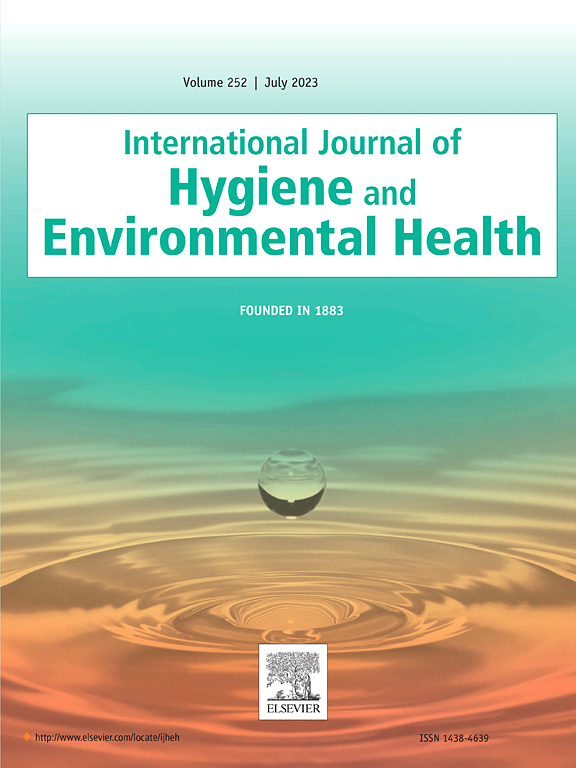摩托车送餐员工作条件、车辆因素、与工作相关的肌肉骨骼疾病对工作满意度和工作压力的影响
IF 4.4
2区 医学
Q1 INFECTIOUS DISEASES
International journal of hygiene and environmental health
Pub Date : 2025-05-13
DOI:10.1016/j.ijheh.2025.114594
引用次数: 0
摘要
自2019冠状病毒病大流行以来,摩托车送餐员(mfdr)的使用激增。本研究通过一项横断面、自我报告的在线调查,从2021年11月到2022年2月,调查了泰国清迈mfdr中与工作相关的肌肉骨骼疾病(WRMSDs)的患病率及其相关因素。该调查包括454名参与者,主要是单身男性,不吸烟,工作一年以上,在白班期间从事静态的重复性工作。在过去的12个月里,最常见的wrmsd是颈部、下背部和肩部疼痛,疼痛评分从4.6到6.6不等。超过一半的参与者表示,与之前的职业相比,他们的症状有所恶化。与wrmsd相关的重要因素包括工作时间、笨拙的姿势、重复的动作和年龄。每周每多工作一小时,颈部、肩部、上背部和大腿区域疼痛的风险就会增加(调整后的奇数比(aOR) 1.02-1.03)。笨拙的姿势与颈部、肩部、上背部和下背部疼痛有关(aOR为1.64-2.38)。重复性运动与肩、腕、肘疼痛相关(aOR 2.11-3.16)。与车辆相关的因素,如发动机容量110毫升和更大的运输袋与手腕疼痛有关(aOR 1.94-2.12),而离合器齿轮的使用与膝盖和脚踝疼痛有关(aOR 2.00和1.79)。这些发现强调了人体工程学摩托车干预、骑手姿势训练、腰椎支撑和工作条件改善的必要性,以减少mfdr中的wrmsd。本文章由计算机程序翻译,如有差异,请以英文原文为准。
The relationship between working conditions, vehicle factors, and work-related musculoskeletal disorders affecting job satisfaction and job stress among motorcycle food delivery riders
The use of motorcycle food delivery riders (MFDRs) has surged since the COVID-19 pandemic. This study investigates the prevalence of work-related musculoskeletal disorders (WRMSDs) and associated factors among MFDRs in Chiang Mai, Thailand, through a cross-sectional, self-reported online survey conducted from November 2021 to February 2022. The survey included 454 participants, primarily single, male, non-smokers, working over a year, and performing static, repetitive tasks during day shifts. The most common WRMSDs reported over the past 12 months and as new-onset conditions were neck, lower back, and shoulder pain, with pain scores ranging from 4.6 to 6.6. Over half of the participants noted worsening symptoms compared to their previous occupations. Significant factors associated with WRMSDs included working hours, awkward posture, repetitive movements, and age. Each additional working hour per week increased the risk of pain in the neck, shoulder, upper back, and thigh regions (adjusted odd ratio (aOR) 1.02–1.03). Awkward posture was linked to neck, shoulder, upper back, and lower back pain (aOR 1.64–2.38). Repetitive movements correlated with shoulder, wrist, and elbow pain (aOR 2.11–3.16). Vehicle-related factors such as engine capacity >110 cc and larger delivery bags were associated with wrist pain (aOR 1.94–2.12), while clutch gear use was linked to knee and ankle pain (aOR 2.00 and 1.79). These findings highlight the need for ergonomic motorcycle interventions, rider posture training, lumbar support, and work condition improvements to reduce WRMSDs among MFDRs.
求助全文
通过发布文献求助,成功后即可免费获取论文全文。
去求助
来源期刊
CiteScore
11.50
自引率
5.00%
发文量
151
审稿时长
22 days
期刊介绍:
The International Journal of Hygiene and Environmental Health serves as a multidisciplinary forum for original reports on exposure assessment and the reactions to and consequences of human exposure to the biological, chemical, and physical environment. Research reports, short communications, reviews, scientific comments, technical notes, and editorials will be peer-reviewed before acceptance for publication. Priority will be given to articles on epidemiological aspects of environmental toxicology, health risk assessments, susceptible (sub) populations, sanitation and clean water, human biomonitoring, environmental medicine, and public health aspects of exposure-related outcomes.

 求助内容:
求助内容: 应助结果提醒方式:
应助结果提醒方式:


